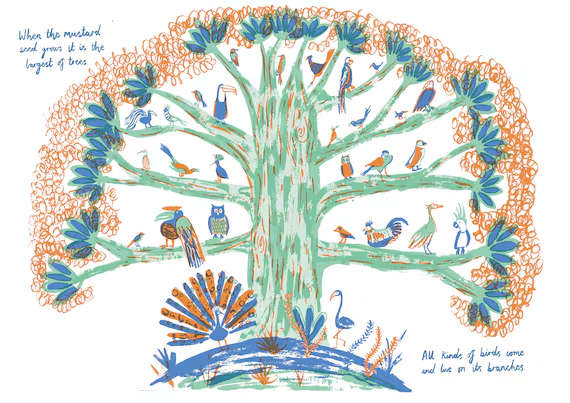
To illustrate the growth of the kingdom of God, Jesus tells two little stories, two parables, one about growing seed, the other about a mustard seed.
The word “parable” literally means “to cast something parallel.” Jesus’ parables describe the nature and activity of the Kingdom of God by comparing them with simple, everyday events from ordinary life. Jesus put the common in direct juxtaposition with the uncommon, the seen with the unseen, the natural with the supernatural and the human with the divine. Jesus is a master at using this parallelism to convey deep spiritual wisdom, especially in the face of hostility to his claims or confrontation to his authority. BUT first a short story:
A small farming village was threatened with drought because the rains had failed to arrive. On a hot and dry Sunday, the elderly priest told his congregation, “There isn’t anything that will save us except to pray for rain. Go home, pray, believe, and come back next Sunday ready to thank God for sending rain.” The people returned to church the following Sunday. As they sat down the elderly priest gently rebuked them. “We can’t worship today because you do not yet believe,” he said. “But we prayed” they protested, “and we do believe.” “Believe?” he responded. “Then where are your umbrellas?”
Faith is made visible by our actions. So let me ask you this morning “Where are your umbrellas?” Do you have umbrella faith? Our gospel this morning speaks about developing umbrella faith. Jesus is speaking about the kingdom of God and how that kingdom grows. It grows with an unwavering faith, a faith that we cannot see or understand but a faith demonstrated by results.
The parables Jesus tells today are not about gardening or farming. Jesus is using images from gardening or farming to talk about your life and my life. His parable is a metaphor for the way God works in our lives. It’s meant to be an encouragement and to offer hope.
Our lives are like a garden that has been planted with seeds. And you know how that works. It takes time. And a lot happens underground, hidden within the soil of our lives. There’s a lot of waiting. And then one day something sprouts and begins to grow, first the stalk, then the head, then the full grain in the head. We are always in process, living into our completion.
What do you wish was growing in the garden of your life? What colours or fragrances are missing? Where have weeds taken over? What needs attention?
I’m well aware that I have asked you more questions than I’ve given you answers. I have no answers, and Jesus offers none in today’s parable. Parables don’t offer answers, they ask us better questions. They give us our work to do.
(… Continued from bulletin here)
In order for the seed of faith to be planted and grow in us, we need to hear the word of God. The kingdom of God is hard to understand, so Jesus took time to explain it. The kingdom was hidden from our earthly view, so Jesus used the parable of the lamp to explain that what was kept hidden in the darkness needed to be brought into the light. The kingdom of God has to be brought from the darkness of our limited ability to understand it, through teaching from learned preachers. Those who hear the word of God and take it to heart will be richly blessed.
We, like the disciples, are expected to bear fruit by spreading the seeds of faith, namely, the Good News of salvation, and nurture it as best we can. Then, we have to let God go to work. God will eventually reap the harvest and save those who hear His word. The growth has to take place spontaneously and in the proper environment, and if it does, the kingdom will become even bigger than the bush produced by the mustard seed.
People who undergo this spiritual journey will become more loving, understanding and calm. They know through experience that growth is a slow process. That is why, even if we spend more and more time in the church, we cannot be so proud as to claim that we have already become like Jesus. Serving more is not necessarily a sign of growth because of different incentives. God knows the desires of our hearts. If our only motivation in serving Him is to love Him, then spiritual growth is sure to come our way.
There are no shortcuts to spiritual growth. Much like the growth of a plant, it will be an organic process. Along the way, there will be storms and other problems, but the growth process will continue. Sometimes we ask why it seems that we are not growing at all. The key is patience and perseverance.
Today’s parables propose a different lens through which to see ourselves, others, and the world. And maybe seeing differently is the beginning of being different. What are these parables showing you about your life and the world? What do you see today?
–Dcn. Terry Murphy

